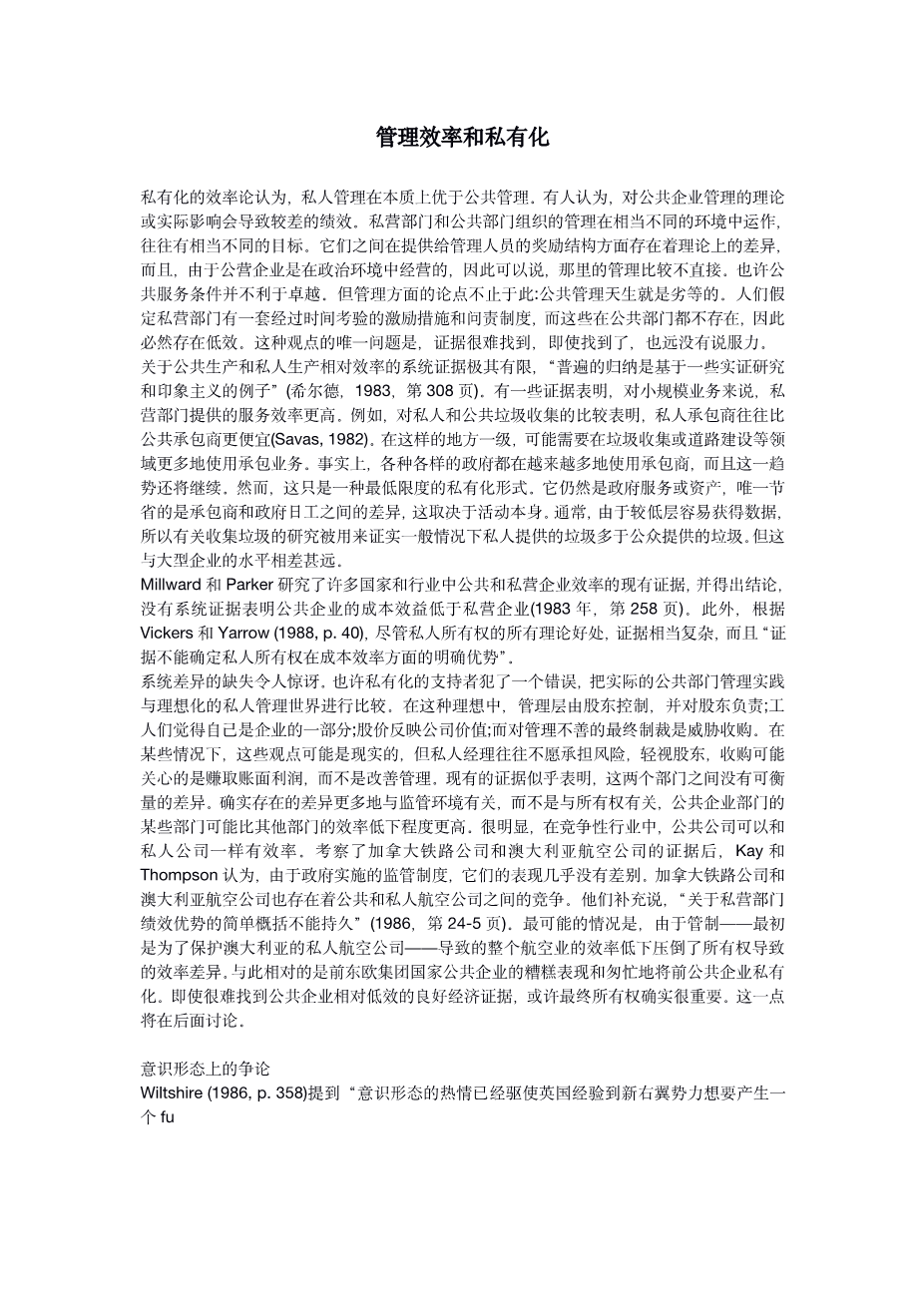Managerial efficiency and privatization
The efficiency argument for privatization claims that private management is inherently superior to public management. There are argued to be theoretical or practical influences on public enterprise management that lead to inferior performance. Managements of private and public sector organizations do operate in quite different environments and often have quite different objectives. There are theoretical differences between them in the structure of incentives available to management, and, because public enterprises operate in a political environment, management there may be said to be less straightforward. Perhaps public service conditions are not conducive to excellence. But the managerial argument is more than this: it is that public management is inherently inferior. The private sector is assumed to have a time-tested set of incentives and accountabilities in place, and as these are not present in the public sector, there must be inefficiency. The only problem with this view is that evidence is hard to find, and far from persuasive when it is found.
Systematic evidence on the relative efficiency of public and private production is extremely limited and universal generalizations are drawn on the basis of a few empirical studies and impressionistic examples (Heald, 1983, p. 308). For small-scale operations there is some evidence that private provision is more efficient. For example, a comparison of private and public refuse collection shows that private contractors tend to be cheaper than public ones (Savas, 1982). At such a local level, there may be a case for greater use of contracting-out in areas like refuse collection or road construction. In fact, governments of all persuasions are increasingly using contractors, and this trend will continue. It is, however, only a minimal form of privatization. It is still a government service or asset, and the only saving is the difference between contractors and government day labor, which varies according to the activity itself. Often the ease of gaining data at the lower level means that studies about refuse collection are used to substantiate the general case for private provision over public. But it is a far cry from this to the level of large enterprises.
Millward and Parker studied available evidence on public and private enterprise efficiency in numerous countries and industries and concluded that there was no systematic evidence that public enterprises are less cost-effective than private firms (1983, p. 258). Also, according to Vickers and Yarrow (1988, p. 40), for all the theoretical benefits of private ownership, evidence is rather mixed, and the evidence does not establish the clear-cut superiority of private ownership in respect of cost efficiency.
The absence of systematic differences is surprising. Perhaps the proponents of privatization make the mistake of comparing actual public sector management practices with an idealized private management world. In this ideal, management is controlled by, and is accountable to, its shareholders; workers feel part of their enterprise; the share price reflects the value of the company; and the final sanction for poor management is the threat of takeover. In some cases, these views may be realistic, but private managers are often averse to taking risks, treat their shareholders with contempt, and takeovers may be concerned with making paper profits rather than improving management. The available evidence seems to suggest no measurable difference between the two sectors. The differences that do exist are more related to the regulatory environment than to ownership and some parts of the public enterprise sector may have greater inefficiencies than others. It seems evident that public firms in competitive industries can be as efficient as private firms. Reviewing the evidence available on Canadian Railways - where there is also a public and private carrier in competition - and Australian airlines, Kay and Thompson argue that because of the regulatory regimes imposed by governments, there is very little difference in their performance. They add no simple generalization about superiority of private sector performance can be sustained (1986, pp. 24-5). It is most likely that inefficiency in the whole airline industry as the result of regulation - originally imposed to protect the private carrier in Australia - overwhelms any difference in efficiency as the result of ownership. Against this is the abysmal performance of public enterprise in the former Eastern Bloc nations and the haste with which former public enterprises were privatized. Even if good economic evidence of relative public enterprise inefficiency is hard to find, perhaps in the end ownership does matter. This point will be examined later.
Ideological arguments
Wiltshire (1986, p. 358) mentions the ideological fervour which has driven British experience to the point where New Right forces want to produce a fundamental irreversible redistribution of power and voting intention. Privatization is part of the more general debate about the respective merits of market and non-market systems of resource allocation. Ideological considerations are certainly important for the privatization debate. On one side there are those who argue that privatization affirms the limited role of government and the superiority of private enterprise. On the other side some opponents of privatization are equally ideological. Public enterprise is seen as bringing closer a fairer, even socialist, society. This group, therefore, fervently opposes all privatization.
There is no doubt that in the early Thatcher government privatization was largely driven by ideology, assisted by pro-market think-tanks and changes in economic ideology. The ideological fervour faded somewhat, even before the Conservative government lost office. The Labour Partys return to pow
剩余内容已隐藏,支付完成后下载完整资料


英语译文共 1 页,剩余内容已隐藏,支付完成后下载完整资料
资料编号:[262228],资料为PDF文档或Word文档,PDF文档可免费转换为Word
以上是毕业论文外文翻译,课题毕业论文、任务书、文献综述、开题报告、程序设计、图纸设计等资料可联系客服协助查找。
您可能感兴趣的文章
- 通过在消费者心中树立品牌关系导向来提高酒店品牌绩效外文翻译资料
- “友好“抱怨行为:走向亲密的手段外文翻译资料
- 服务蓝图:针对关键服务流程的有效方法-在四星级国际酒店Arash Shahin 管理部进行案例研究外文翻译资料
- 组织中女性高管职业生涯规划与晋升的视角:连锁性别偏见的经验,双重束缚,和不成文的晋升规则外文翻译资料
- 影响优秀员工工作满意度的激励因素识别外文翻译资料
- 探索离职意向的影响因素:以豪华酒店员工为例外文翻译资料
- 新冠肺炎疫情下,中国酒店旅游业面临的挑战与机遇外文翻译资料
- 酒店Twitter账号的营销效果:以沙特阿拉伯为例外文翻译资料
- 酒店旅游市场营销外文翻译资料
- 中国经济型酒店SWOT分析外文翻译资料


